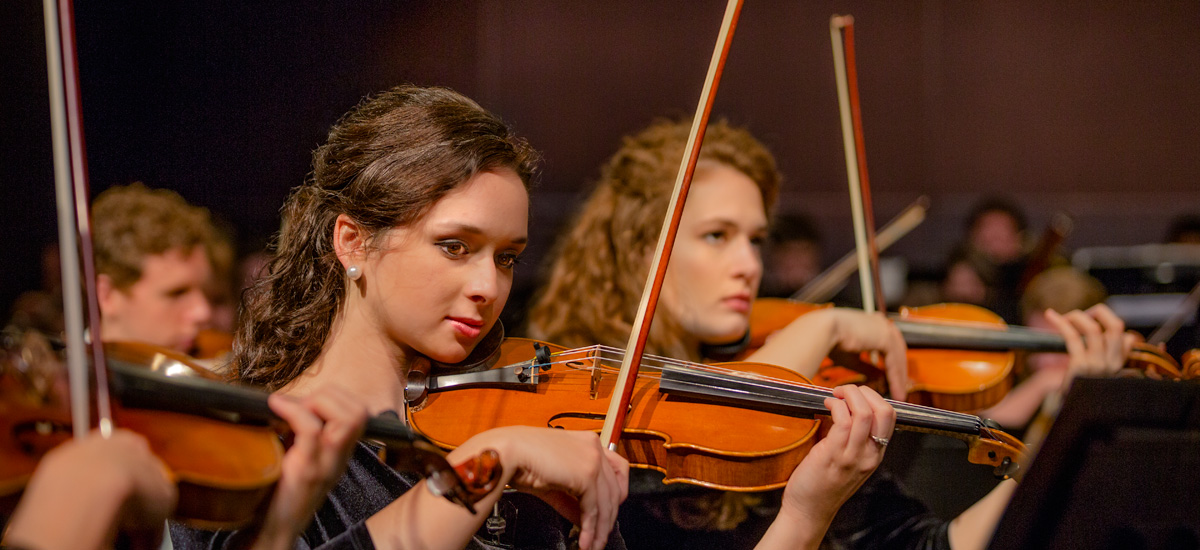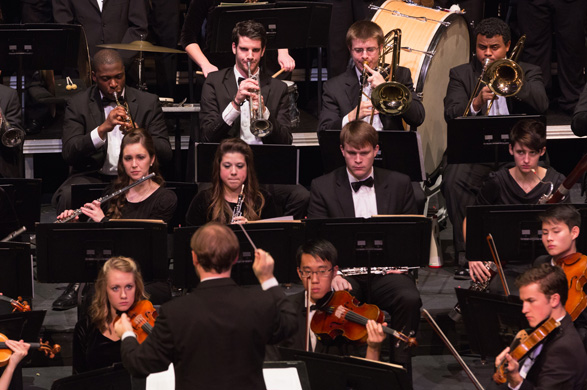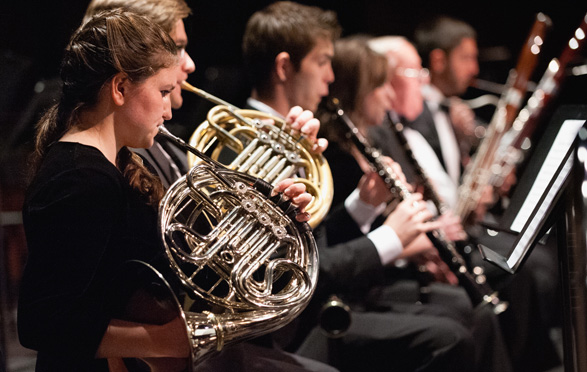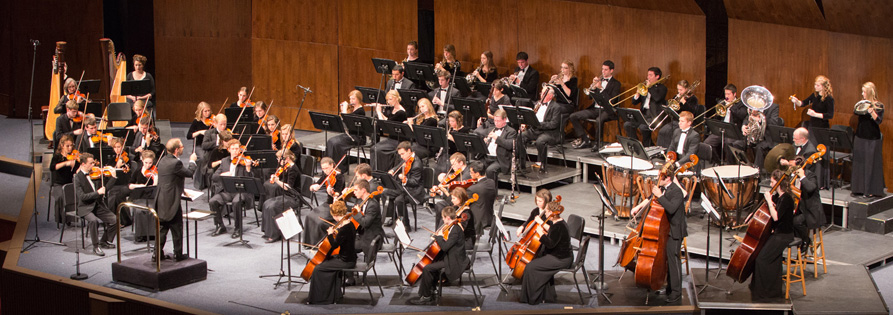
Orchestral Instrument Performance
Bachelor of Music
Excellent performance education rooted in theory, technique and artistry
Overview
God has given us the beautiful gift of music for our joy and His glory. At BJU you’ll explore the intricacies of music through careful study and practice under highly qualified, experienced faculty. Whether you improve your instrumental skills or learn how to compose, record or mix music with technology, you’ll grow in your knowledge and appreciation of music.
And you’ll learn why excellent musicianship matters to believers, and how to pursue that excellence in a way that displays God’s perfection.
Available Principals
- Bassoon
- Cello
- Clarinet
- Double bass
- Euphonium
- Flute
- Guitar
- Harp
- Horn
- Oboe
- Percussion
- Saxophone
- Trombone
- Trumpet
- Tuba
- Viola
- Violin

Program
Within BJU’s performance program, you’ll build a solid foundation in theory and technique. You’ll learn how to create compelling music with elements such as tonality, harmonic sequences and chromaticism—and how they work together to produce coherent, expressive art. You’ll sharpen specific performance skills so you can grow as a musician and play your instrument expertly.
In addition, you’ll build a solid foundation in music history, from ancient through contemporary. Each period of music will help you understand how society and culture influence music and how the introduction of new instruments, styles and technologies has developed Western music.
From your initial audition you’ll work closely with your professors. These caring faculty members know what it takes to be a performer and will customize the way they teach to meet your needs so you can excel as a musician, expand your repertoire and perform at your best.
Audition
To study in a music program, you’ll need to audition so the music faculty can evaluate your music background and current skill level. The audition will help them assess your potential as a music student and understand how to equip you to reach it.
BJU Core
Liberal arts courses such as economics, philosophy and speech, will challenge you to see life from a broad perspective. These subjects also help you develop the life skills—critical thinking, problem solving, creativity, effective communication—needed for flexibility in your career. Since communication skills are important for musicians, these core courses will enhance your powers of expression.
Your Bible courses will connect your pursuit of God to all of life, especially your work as a performer. These courses will encourage you to make your relationship with God your top priority and to view music ethics and practices through God’s Word. More importantly, you’ll learn how to point others to God’s beauty and holiness, and the hope found only in the person and work of Jesus Christ.
Electives
Since orchestral instrument performance is a busy program, much of your course schedule is already set, except your second instrument concentration. If you’d like to take more Bible or liberal arts courses, you can explore online course options.
Success

Laura Majewski, ’13
I chose Bob Jones University because I knew I could trust the spiritual, musical and academic content of the education I would receive. I have not been disappointed! The rigorous liberal arts core challenged my thinking and prepared me to interact professionally with future colleagues and students. My music classes and performance opportunities honed my skills and offered me real-life experiences that will be an asset in my future endeavors. I am thankful for the variety and abundance of performance experiences I received here (band, orchestra, opera, small ensembles, competitions and tours) that are not available to my peers at other institutions. However, the spiritual climate has impacted me the most. The emphasis on doing all—from Bible, English and science, to music theory and opera—for the glory of God will influence me for the rest of my life. I am thankful for the faculty members in every department who communicated passion for the Gospel in and out of the classroom. My teachers not only taught history, hermeneutics and counterpoint; they taught students. And they have inspired me to do the same.
Your Future
Jobs
The orchestral instrument performance program at BJU unlocks many career possibilities.
- Orchestra performer
- Band performer
- Solo performer
- Private studio instructor
- Studio musician
- Church musician
Graduate Schools
Our orchestral instrument performance grads have been admitted into notable grad schools.
- Boston University
- University of Cincinnati College-Conservatory of Music
- Cleveland Institute of Music
- Florida State University
- Louisiana State University
- Peabody Conservatory
- Rice University, The Shepherd School of Music
- Southern Methodist University
- University of Colorado
- University of Illinois
- University of Kentucky
- University of North Carolina School of the Arts
Graduate Experience
Orchestral instrument performance grads excel in various settings.
- Principal trumpet, Green Bay Symphony
- Private studio instructor
- Suzuki violin instructor
- Section leader, Kansas City Symphony
- Principal clarinet, San Francisco Ballet
- Principal oboe, Kentucky Symphony
- Horn, 392nd Army Band
- Horn, 98th Army Band
- Violin, Huntsville Symphony Orchestra
- Violin, Richmond Symphony
- Trumpet researcher, designer and maker

Career Support
BJU offers students lots of ways to network with employers and organizations. Many jobs are posted each year on Career Central, our online job board. And more than 60 businesses and 150 Christian schools/organizations/mission boards recruit students through on-campus interviews and job/ministry fairs.
Our Center for Career & Calling also holds seminars on resume prep and interview techniques for students.
Learning Experience

Music Groups
Membership in the University’s bands, orchestras or choirs will provide you with incredible opportunities for developing your musicianship under the direction of our acclaimed faculty conductors. You’ll also be challenged to achieve your best in your principal through private lessons, culminating in a senior recital.
Recitals
Once you complete your sophomore year platform check, you’ll prepare for your junior and senior recitals. These recitals are a significant part of the performance program and play a major role in preparing you for your career.
These recitals will help you build your repertoire and teach you how to prepare for performances.
Gustafson Fine Arts Center Music Library
The Music Library offers you access to a variety of online and print music resources.
- 15,000 bound scores
- 5,500 chamber and choral music pieces
- 7,200 biographies and books on music
- 7,100 LP recordings
- 8,220 musical CDs
- 850 musical DVDs
Performances
At BJU you’ll experience various excellent performances both as a performer and audience member. You’ll grow through personal performances, junior and senior recitals, large and small ensemble recitals, the Concerto and Aria Competition, Annual Music Contests and Student Recital Hours.
You’ll also observe accomplished artists in the Concert, Opera & Drama Series, such as the King’s Singers, Canadian Brass and Prague Symphony Orchestra. You may even have an opportunity to perform under professional guest conductors in these productions.
Practice Resources
We have many resources available to help you master your instrument through invaluable practice. Four buildings across campus contain practice rooms, and you can use the music computer lab equipped with composition software such as Finale and MuseScore.
Faculty

Bruce Cox
Division of Music
BJU’s orchestral instrument performance faculty graduated from some of America’s finest grad schools. Many currently perform in local orchestras such as Greenville Symphony and Spartanburg Philharmonic.
They’ve also won prestigious national contests such as the MTNA Collegiate Brass graduate division and the Holland America Music Society.
Courses & Objectives
Sample Course Outline
1st Year
- Pathways
- Composition & Rhetoric
- Recital Attendance
- Theory I
- Practical Musicianship I
- Fundamentals of Speech
- Private Instrn: Instrument Maj/Prin
(2 credits) - Applied Secondary - Piano
(1 credits) - Instrumental Ensemble Elective
(1 credits)
- Composition & Literature
- Creation to New Creation: Exploring the Bible for Life
- Recital Attendance
- Introduction to Music Literature
- Theory II
- Practical Musicianship II
- Instrumental Ensemble Elective
(1 credits) - Private Instrn: Instrument Maj/Prin
(2 credits) - Applied Secondary - Piano
(1 credits)
2nd Year
- Ideas & Their Consequences
- Recital Attendance
- Theory III
- English or Writing Elective
(3 credits) - Private Instrn: Instrument Maj/Prin
(3 credits) - Chamber Ensemble Elective
(1 credits) - Instrumental Ensemble Elective
(1 credits)
- The Making of the Modern World
- Hermeneutics: Interpreting the Bible for Life
- Recital Attendance
- Introduction to Music Technology
- Theory IV
- Private Instrn: Instrument Maj/Prin
(3 credits) - Instrumental Ensemble Elective
(1 credits) - Chamber Ensemble Elective
(1 credits)
3rd Year
- Essential Science
- Bible Doctrines
- Recital Attendance
- History of Music: Antiquity to Baroque
- Elements of Conducting
- Private Instrn: Instrument Maj/Prin
(3 credits) - Chamber Ensemble Elective
(1 credits) - Instrumental Ensemble Elective
(1 credits)
- Bible Doctrines
- Recital Attendance
- Orchestral Repertoire
- History of Music: Classical to Contemporary
- Entrepreneurial Musician Seminar
- Instrumental Ensemble Elective
(1 credits) - Chamber Ensemble Elective
(1 credits) - Private Instrn: Instrument Maj/Prin
(3 credits)
4th Year
- Worldview & Apologetics
- Recital Attendance
- Eighteenth-Century Counterpoint
- Oral Communication for the Professions
- Private Instrn: Instrument Maj/Prin
(3 credits) - Instrument Literature Survey
(3 credits) - Instrumental Ensemble Elective
(1 credits)
- Foundations of Economics
- Recital Attendance
- Seminar in Performance-EXP
- Music & the Creative Image-Bearer
- Form & Analysis
- Private Instrn: Instrument Maj/Prin
(3 credits) - Instrument Pedagogy
(2 credits) - Instrumental Ensemble Elective
(1 credits)
- Program
- BJU Core
- Elective
Program Objectives
Each student will:
- Apply knowledge of performance practices, music history and music theory relevant to performance settings.
- Evaluate literature, materials, methods and technology used in successful studio teaching.
- Perform public recitals that apply mature musical interpretation and advanced instrumental skills.

